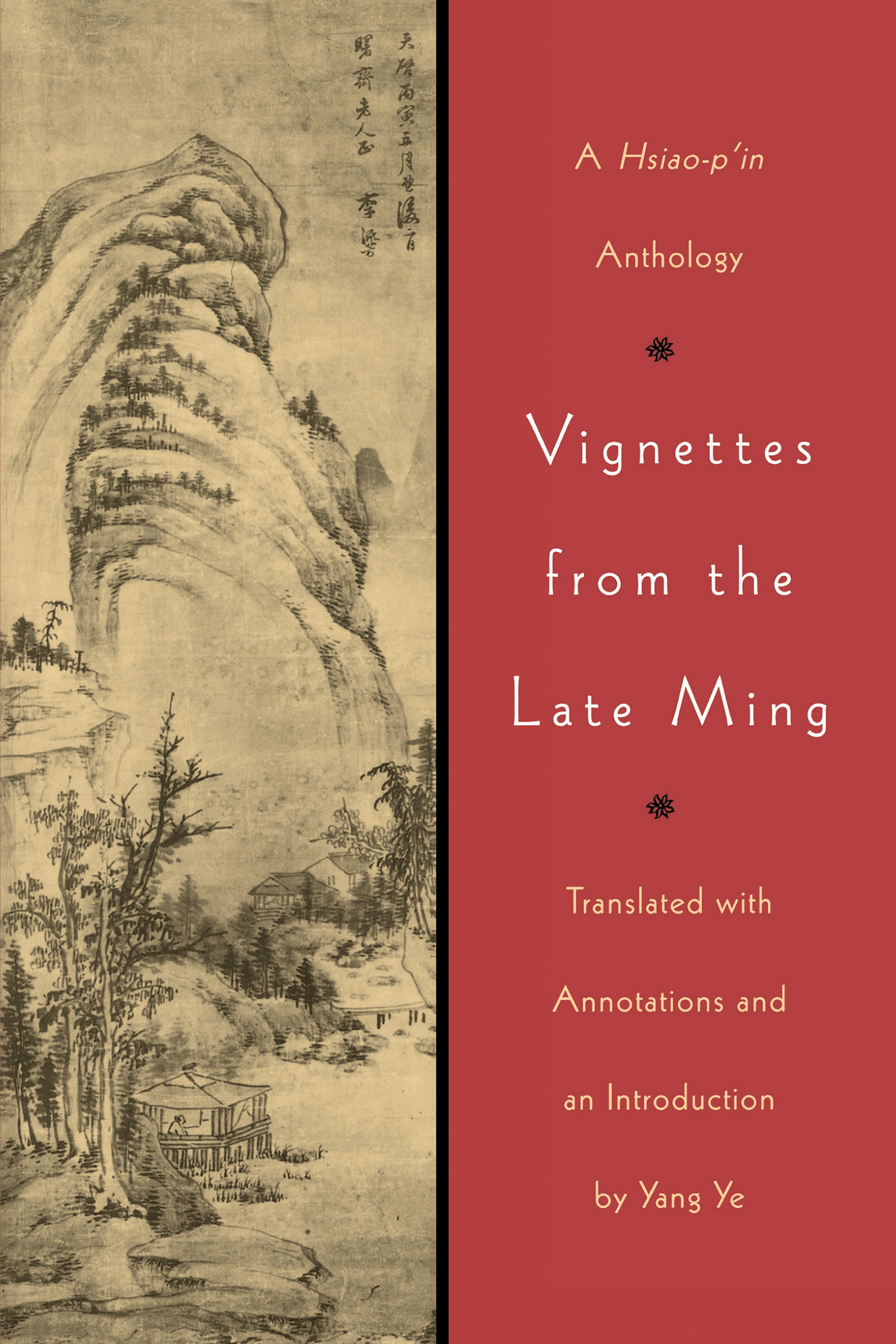Vignettes from the Late Ming
Acknowledgments
Hsiao-p'in of the late Ming: An Introduction
Editorial Notes
Map
Kuei Yu-kuang
1) Foreword on "Reflections on The Book of Documents"
2) A Parable of Urns
3) Inscription on the Wall of the Wild Crane Belvedere
4) The Craggy Gazebo
5) The Hsiang-chi Belvedere
6) An Epitaph for Chillyposy
Lu Shu-sheng
1) Inkslab Den
2) Bitter Bamboo
3) A Trip to Wei Village
4) A Short Note about My Six Attendants in Retirement
5) Inscription on Two Paintings in My Collection
6) Inscription on a Portrait of Tung-p'o Wearing Bamboo Hat and Clogs
Hsü Wei
3) To Ma Ts'e-chih
4) Foreword to Yeh Tzu-shu's Poetry
5) Another Colophon (On the Model Script "The Seventeenth" in the Collection of Minister Chu of the Court of the Imperial Stud)
6) A Dream
Li Chih
1) Three Fools
2) In Praise of Liu Hsieh
3) A Lament for the Passing
4) Inscription on a Portrait of Confucius at the Iris Buddhist Shrine
5) Essay: On the Mind of a Child
T'u Lung
1) A Letter in Reply to Li Wei-yin
2) To a Friend, while Staying in the Capital
3) To a Friend, after Coming Home in Retirement
Ch'en Chi-ju
2) Trips to See Peach in Bloom
3) Inscription on Wang Chung-tsun's A History of Flowers
4) A Colophon to A History of Flowers
5) A Colophon to A Profile of Yao P'ing-chung
6) Selections from Privacies in the Mountains
Yüan Tsung-tao
1) Little Western Paradise
2) A Trip to Sukhavati Temple
3) A Trip to Yüeh-yang
4) Selections from Miscellanea
Yüan Hung-tao
2) First Trip to West Lake
3) Waiting for the Moon: An Evening Trip to the Six Bridges
4) A Trip to the Six Bridges after a Rain
5) Mirror Lake
6) A Trip to Brimming Well
7) A Trip to High Beam Bridge
8) A Biography of the Stupid but Efficient Ones
9) Essay: A Biography of Hsü Wen-ch'ang
Yüan Chung-tao
1) Foreword to The Sea of Misery
2) Shady Terrace
3) Selections from Wood Shavings of Daily Life
Chung Hsing
1) Flower-Washing Brook
2) To Ch'en Chi-ju
3) A Colophon to My Poetry Collection
4) Colophon to A Drinker's Manual (Four Passages)
5) Inscription after Yüan Hung-tao's Calligraphy
6) Inscription on My Portrait
Li Liu-fang
1) A Short Note about My Trips to Tiger Hill
2) A Short Note about My Trips to Boulder Lake
3) Inscriptions on An Album of Recumbent Travels in Chiang-nan (Four Passages)
4) Horizontal Pond
5) Boulder Lake
6) Tiger Hill
7) Divinity Cliff
1) Inscription on A Picture of Solitary Hill on a Moonlit Night
Wang Ssu-jen
1) A Trip to Brimming Well
2) A Trip to Wisdom Hill and Tin Hill
3) Passing by the Small Ocean
4) Shan-hsi Brook
T'an Yüan-ch'un
1) First Trip to Black Dragon Pond
2) Second Trip to Black Dragon Pond
3) Third Trip to Black Dragon Pond
Chang Tai
1) Selections from Dream Memories from the T'ao Hut
2) A Night Performance at Golden Hill
3) Plum Blossoms Bookroom
4) Drinking Tea at Pop Min's
5) Viewing the Snow from the Mid-Lake Gazebo
6) Yao Chien-shu's Paintings
7) Moon at Censer Peak
8) Liu Ching-t'ing the Storyteller
9) West Lake on the Fifteenth Night of the Seventh Month
10) Wang Yüeh-sheng
11) Crab Parties
12) Lang-hsüan, Land of Enchantment
1) An Epitaph for Myself
2) Preface to Searching for West Lake in Dreams
Appendix A: Table of Chinese Historical Dynasties
Appendix B: Late Ming through Early Ch'ing Reign Periods
Notes
Bibliography
Index

